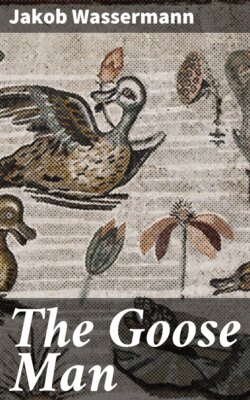Читать книгу The Goose Man - Jakob Wassermann - Страница 3
На сайте Литреса книга снята с продажи.
I
ОглавлениеTable of Contents
The landscape shows many shades of green; deep forests, mostly coniferous, extend from the valley of the Rednitz to that of the Tauber. Yet the villages lie in the midst of great circles of cultivated land, for the tillage of man is immemorial here. Around the many weirs the grass grows higher, so high often that you can see only the beaks of the droves of geese, and were it not for their cackle you might take these beaks to be strangely mobile flowers.
The little town of Eschenbach lies quite flat on the plain. In it a fragment of the Middle Ages has survived, but no strangers know it, since hours of travel divide it from any railway. Ansbach is the nearest point in the great system of modern traffic; to get there you must use a stage-coach. And that is as true to-day as it was in the days when Gottfried Nothafft, the weaver, lived there.
The town walls are overgrown with moss and ivy; the old drawbridges still cross the moats and take you through the round, ruined gates into the streets. The houses have bay-windows and far-projecting overhangs, and their interlacing beams look like the criss-cross of muscles on an anatomical chart.
Concerning the poet who was once born here and who sang the song of Parsifal, all living memory has faded. Perhaps the fountains whisper of him by night; perhaps sometimes when the moon is up, his shadow hovers about the church or the town-hall. The men and women know nothing of him any more.
The little house of the weaver, withdrawn by a short distance from the street, stood not far from the inn at the sign of the Ox. Three worn steps took you to its door, and six windows looked out upon the quiet square. It is strange to reflect that the spirit of modern industrialism hewed its destructive path even to this forgotten nook of the world.
In 1849, at the time of Gottfried Nothafft’s marriage—his wife, Marian, was one of the two Höllriegel sisters of Nuremberg—he had still been able to earn a tolerable living. So the couple desired a child, but desired it for years in vain. Often, at the end of the day’s work, when Gottfried sat on the bench in front of his house and smoked his pipe, he would say: “How good it would be if we had a son.” Marian would fall silent and lower her eyes.
As time passed, he stopped saying that, because he would not put the woman to shame. But his expression betrayed his desire all the more clearly.
